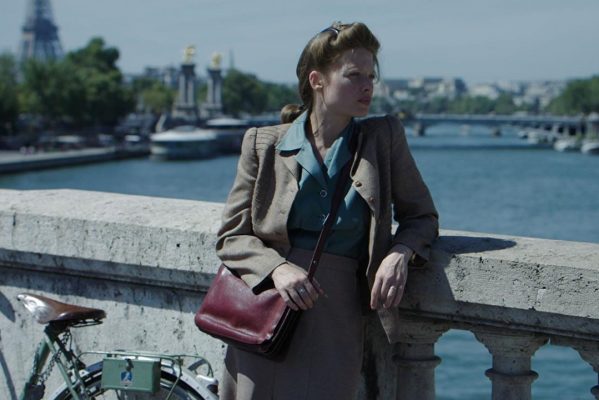@Filmhouse, Edinburgh from Mon 1 july 2019
Truly capturing the essence of emotion is one of the greatest feats that can be accomplished by the collaborative process of actors and filmmakers. Just as delving deep into the human condition and portraying it in a way that sweeps an audience along with the characters is ultimately the goal of most artists. Whilst joy, love or the thrills of cathartic release are the usual arcs of many films, in Memoir of War, Emmanuel Finkiel seeks to dig into the depths of despair. Despite a not inconsiderable cast, this is almost entirely burdened upon the shoulders of Mélanie Thierry, in what ought to be a career landmark performance.
Based on the autobiographical novel by Marguerite Duras, Memoir of War recounts her experiences during the months leading up to and immediately after the liberation of Paris in 1944. During this time, she lived in constant anxious dread waiting to hear word of her husband, Robert Antelme (Emmanuel Bourdieu) who had been arrested by the Gestapo for resistance. As a famous writer, she manages to catch the attention of the local French police agent, interrogator and book lover, Rabier (Benoît Magimel). Through this strange and awkward acquaintanceship, they each probe at each other for information.
The original title of Duras’ book is La Douleur, which could be translated variously as the sorrow, the pain, or even, the suffering. And it’s curious that rather than play up this aspect of the story, the film’s English title, as well as the marketing campaign instead focus on the war. The trailers and materials for the film suggest something more along the conventional lines of a similarly themed movie such as Zwartboek. Instead, Finkiel’s adaptation seems to be a caught between trying to recount the events depicted in a cinematic way, and to evoke the lyrical fury of the book. As a result, the film seems to chug through in fits and starts; clashing awkwardly from moments of direct and almost poetic narration, to repetitive but uneventful scenes of brief conversations and interminable shots of Thierry wandering around looking lost. Added in to this that even the cat and mouse relationship between Rabier and Duras is abandoned around the midpoint of the film, after threatening the audience with a moment of high drama that never quite occurs.
It’s all rather unfortunate precisely because as the film gathers to a close, the point of all of this mundanity clarifies, but rather than in a cathartic sense, one where it simply becomes obvious that Finkiel hasn’t managed to convey the emotion properly throughout the film. While Thierry is pouring every ounce of her being into subtle underplaying of an ever-mounting slow dread and panic, the film can’t decide what it’s really trying to be about. This isn’t helped by the fact that the narrative is locked chronologically with the events, except when it isn’t, as several times, the film flits into a day-dream-like “what if?” moment, and various scenes where Duras is literally watching herself with two incarnations of her onscreen at once. All of which is set to a score that periodically devolves into a static-like thrum, topped with moaning strings that sound distractingly like dogs howling.
It is however very much the case, that this is a beautifully shot film, with not a single weak performance among the cast. It’s simply rather a shame that the suffering in this case is likely to come from the groaning audience as they struggle to engage with what should be a fascinating and harrowing evocation of human endurance.
